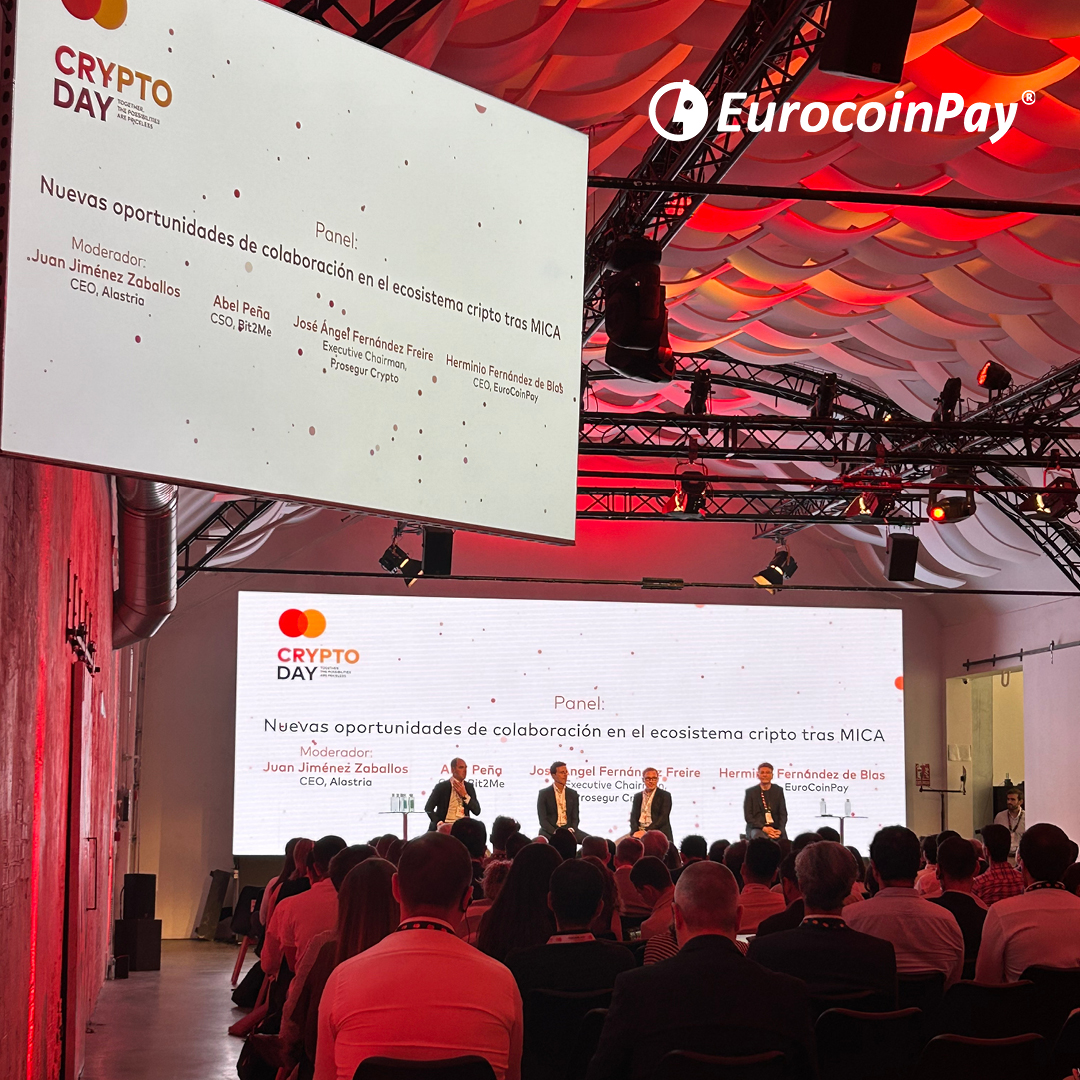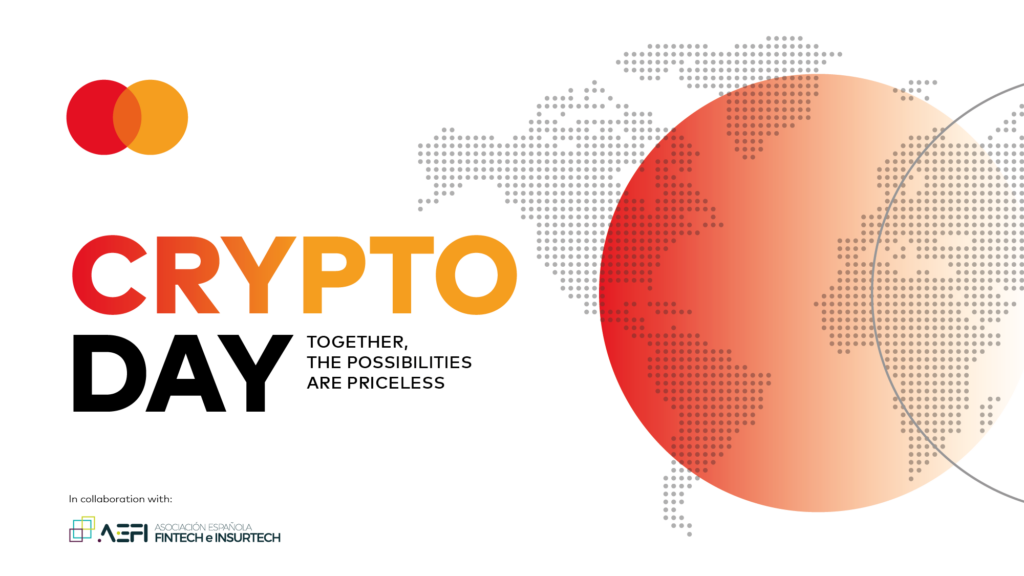On 27 June, Mastercard’s Crypto Day was held in collaboration with the AEFI, an event that provided an opportunity to discuss various topics related to the cryptocurrency industry, where the main players in the sector were able to clarify and share the latest developments affecting the sector and the future that lies ahead in the coming months.

EurocoinPay CEO Herminio Fernández de Blas participated in the panel
“New opportunities for collaboration in the crypto ecosystem after MICA”
One of the round tables of the meeting, led and organised by the AEFI, featured the financial supervisors, the Bank of Spain and the CNMV, and the regulator, the Treasury, led by Alfonso Ayuso, member of the AEFI Board of Directors. This relevant and timely roundtable focused on the approval and publication of the European MiCA Regulation and the regulatory circumstances it brings with it in the EU Member States and, particularly, in Spain. Our country does not currently have a specific regulation that serves as a transition to the new European standard, but for all Member States the countdown to the implementation of MiCA has already begun, so companies in the crypto sector must prepare to meet and comply with the rules of the new European Regulation.
This Regulation creates a new era in the crypto sector, since, to date, there is no regulation in Spain that authorises, licenses and supervises the crypto sector, unlike in other countries such as Germany and France, which do have a law that regulates the crypto companies that operate in those markets. In our country, the Bank of Spain launched the Register of Entities last year in which all companies operating in the crypto sector must be registered. This register has the purpose of complying with everything related to money laundering and terrorist financing, but it is not a licence or authorisation.
The implications of this Regulation go far beyond the enumeration and drafting of the rules that we must comply with in Spain by European mandate, the Regulation harmonises the EU countries and establishes a regulatory framework in which companies must operate, complying with the law. The regulation aims to provide security for financial users, to allow for the harmonised development of companies within the EU and to protect the financial and non-financial industry in crypto operations.
It is worth noting that, apart from MiCA, another package of measures that has been approved in recent months is the European Parliament and Council regulation for market infrastructures based on distributed ledger technology, better known as the DLT Pilot Regime, which seeks to promote the advancement of technologies that enable the transformation of the financial sector, including distributed ledger technologies (DLT), also known as blockchain. In doing so, it aims to reduce the associated risks and, at the same time, expand financial regulation both for issuers of cryptoassets, which are considered financial instruments, and for companies that provide financial services related to these assets.
In the case of Spain, a reform of the Securities Market Law has been carried out to implement this regulation of the European Parliament, which will also make it possible to execute, settle and register any transaction instantaneously, providing benefits not only in terms of time, but also in terms of costs and guarantees.
One of the conclusions adopted was the need to continue talking about MiCA in the next 18 months, when it will be definitively implemented. Europe has granted an extra period of time to help companies to complete their adaptation and correct implementation. And work will continue on this Regulation, as MiCA II seems to be a reality that will materialise sooner or later in the European Union.
At the national level, the existence of the Bank of Spain Registry will have to be reformulated in order to reorganise the supervision, authorisations and licences issued by Spain, as the supervision and authorisation of crypto entities operating in Spain will be the responsibility of the CNMV. However, the three organisations participating in the roundtable emphasised that MiCA may currently generate many doubts, but it will be a great opportunity to attract security, stability and consumer protection, where the connection and collaboration of supervisors and regulators will be essential.
Digital euro
Another of the issues addressed at the conference related to the arrival of the technical guides and second-level standards that MiCA entails and the negotiations, drafting and milestones set by Europe for their implementation. In addition, special emphasis was placed on the arrival of the digital euro, since the European Commission, through a legislative text, has presented its proposal for the introduction of the digital euro, in which limits are established in relation to the levels of possession of this digital currency. The aim is to avoid competition with bank deposits and to guarantee financial stability. In addition, it seeks to prevent money laundering and terrorist financing by regulating its use in situations where there is no internet access.
With MiCA, a new network of collaboration opportunities opens up in the crypto ecosystem
Another of the round tables, “New opportunities for collaboration in the crypto ecosystem after MiCA”, was attended by AEFI partners Bit2me, Prosegur Crypto and EurocoinPay, to present the possibilities for growth, development and value that MiCA brings with it. A regulation that harmonises member states and establishes the same rules of the game for all operators creates a necessary network of collaboration, cooperation and synergies between members of the financial industry. From regulated environments, such as the Financial Sandbox, to highly focused development teams that are important in the ecosystem. All companies welcome the advent of common regulation and standards, among other things, because they allow them to create, develop and test these collaborative projects mentioned above with traditional entities in the financial industry.
New technologies, products and services beyond cryptocurrencies such as Web3, Metaverse and NFT’s were also discussed.
Source: AEFI
Disclaimer: The information set out herein should not be taken as financial advice or investment recommendations. All investments and trading involve risk and it is the responsibility of each individual to do their due diligence before making any investment decision.




